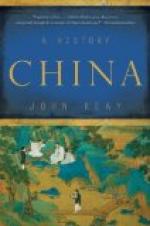The whole of the chancellery had to accompany the emperor, and all the transport necessary for the feeding of the emperor and his government had continually to be diverted to wherever he happened to be staying. All this produced disorder and unrest. The gentry, who at first had so strongly supported the emperor and had been able to obtain anything they wanted from him, now began to desert him and set up pretenders. From 615 onward, after the defeat at the hands of the Turks, risings broke out everywhere. The emperor had to establish his government in the south, where he felt safer. There, however, in 618, he was assassinated by conspirators led by Toba of the Yue-wen family. Everywhere now independent governments sprang up, and for five years China was split up into countless petty states.
(B) The T’ang dynasty (A.D. 618-906)
1 Reforms and decentralization
The hero of the Turkish siege, Li Shih-min, had allied himself with the Turks in 615-16. There were special reasons for his ability to do this. In his family it had been a regular custom to marry women belonging to Toba families, so that he naturally enjoyed the confidence of the Toba party among the Turks. There are various theories as to the origin of his family, the Li. The family itself claimed to be descended from the ruling family of the Western Liang. It is doubtful whether that family was purely Chinese, and in any case Li Shih-min’s descent from it is a matter of doubt. It is possible that his family was a sinified Toba family, or at least came from a Toba region. However this may be, Li Shih-min continued the policy which had been pursued since the beginning of the Sui dynasty by the members of the deposed Toba ruling family of the Northern Chou—the policy of collaboration with the Turks in the effort to remove the Sui.
The nominal leadership in the rising that now began lay in the hands of Li Shih-min’s father, Li Yuean; in practice Li Shih-min saw to everything. At the end of 617 he was outside the first capital of the Sui, Ch’ang-an, with a Turkish army that had come to his aid on the strength of the treaty of alliance. After capturing Ch’ang-an he installed a puppet emperor there, a grandson of Yang Ti. In 618 the puppet was dethroned and Li Yuean, the father, was made emperor, in the T’ang dynasty. Internal fighting went on until 623, and only then was the whole empire brought under the rule of the T’ang.
Great reforms then began. A new land law aimed at equalizing ownership, so that as far as possible all peasants should own the same amount of land and the formation of large estates be prevented. The law aimed also at protecting the peasants from the loss of their land. The law was, however, nothing but a modification of the Toba land law (chuen-t’ien), and it was hoped that now it would provide a sound and solid economic foundation for the empire.




